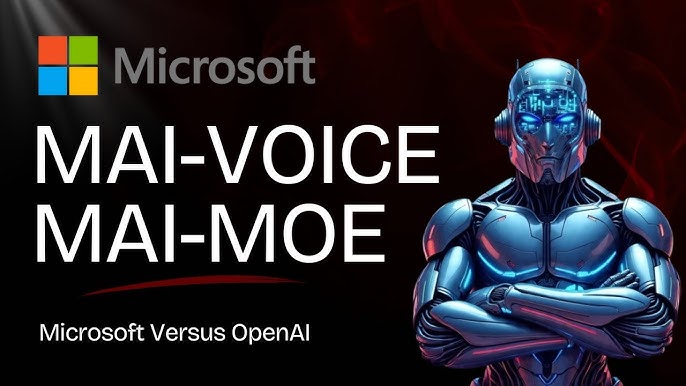Microsoft Unveils MAI-Voice-1: A New Era of Real-Time AI Audio Synthesis

Microsoft Launches Proprietary Real-Time Voice AI Models
Microsoft announced its boldest move yet into AI infrastructure with the debut of MAI-Voice-1 and the public preview of MAI-1, marking a new chapter in their pursuit of AI self-sufficiency. Until now, Microsoft’s headline AI products—including those behind Copilot and Office integrations—ran atop technology from OpenAI. Now, Redmond is racing to reduce dependency and forge a proprietary AI stack.
Why This Matters: AI That Speaks as Fast as You Think
The real standout is MAI-Voice-1, capable of generating a full minute of natural-sounding audio in under one second, all with minimal compute requirements[2]. This is a magnitude faster than most leading voice-generation models, which typically require extensive hardware or longer rendering times. Microsoft designed MAI-Voice-1 for seamless integration in real-time applications, enabling voice assistants, translation services, and accessibility tools to become far more responsive—and accessible on more devices and lower-tier hardware.
For Microsoft, MAI-Voice-1 isn’t just about speed: it’s a strategic asset. Owning the model means tighter integration and customization across the Microsoft product ecosystem, from Windows and Azure to enterprise communications.
The MAI-1 Model: Entering the Foundation Model Arena
Alongside the audio breakthrough, MAI-1 Preview, Microsoft’s next-generation large language model (LLM), is now available for public testing on “LMArena.” By releasing its own foundational LLM for developer experimentation, Microsoft is positioning itself as a direct competitor to other industry titans like Google, Meta, and OpenAI, all while leveraging in-house research from its recent M365 Copilot integrations[2].
What Experts and The Market Are Saying
Industry analysts view this as a pivotal shift: Microsoft is no longer just an AI integrator, but a full-stack AI provider with strong internal R&D. Early feedback from the LMArena preview underscores high interest from the developer community, intrigued by the promise of low-latency, cost-effective AI inference at Microsoft scale. Observers highlight the business implications—expect tighter loops between product feedback, AI updates, and cloud offerings.
What’s Next: Race to AI Independence
The demonstration of MAI-Voice-1’s low compute footprint suggests that consumer and enterprise apps could soon offer real-time voice interaction with even modest hardware. The move is widely seen as Microsoft’s declaration of independence from reliance on external foundation models, and analysts are watching for rapid competition in specialized AI hardware and developer tools. As the MAI-1 family evolves, its impact may reach from enterprise data privacy to affordable accessibility solutions worldwide[2].
How Communities View Microsoft's MAI-Voice-1 and MAI-1 Launch
The announcement of Microsoft’s proprietary AI models has sparked intense discussion across tech forums and social channels. The central debate: Does this mark a real end to Microsoft’s reliance on OpenAI—and is MAI-Voice-1 truly a step ahead?
- Tech Optimists (approx. 40%): On X, users like @liam_aitech hail MAI-Voice-1’s “under-1-second audio generation” as a major leap, with Reddit’s r/MachineLearning threads excited about the possibilities for low-latency, real-time accessibility features. Devs point to the public MAI-1 preview on LMArena as a welcome move for open experimentation.
- Skeptics & OpenAI Loyalists (approx. 35%): Posts on r/artificial and replies from X users such as @janecopenai argue Microsoft is still just catching up, noting that OpenAI and Google already offer strong voice models. Some question if MAI-1 can match LLM quality benchmarks.
- Business Strategists (approx. 15%): Industry analysts like @danielnewman (CEO, Futurum Group) focus on the business angle, praising Microsoft’s drive for stack independence and its implications for cloud and enterprise customers.
- Accessibility Advocates (approx. 10%): Nonprofits and users such as @accessnow and threads in r/AssistiveTech laud the potential for affordable, device-agnostic voice support—citing MAI-Voice-1’s performance on lower-end hardware.
Overall sentiment is cautiously positive: While some tech leaders celebrate the speed gains, others await real-world benchmarks. Global developers are eager to test MAI-1’s LLM preview, with early Reddit reviews noting better-than-expected inference speeds but mixed results on longform coherence. The news has drawn commentary from notable experts, including Satya Nadella and industry AI analysts, spotlighting how this moment shifts the future AI landscape—especially regarding stack ownership and hardware integration.